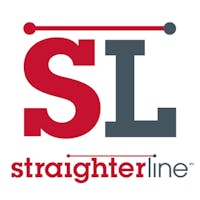“We think college should be affordable and low risk. Everybody should get to go. That’s the DNA of StraighterLine,” says Chief Learning Officer Dr. Amy Smith.
There are 36 million Americans who have some college credit but no degree. StraighterLine aims to change that by supporting degree completion for non-traditional, returning adult students.
“They started, they stopped, they had lives, they went back to work—all the myriad reasons why people start and stop college,” observes Smith. “How do you get them back into college and have them be successful? How do you make it low risk, low cost and unburdensome?”
Through strategic partnerships with universities, StraighterLine makes degree completion more affordable and accessible for pre-college, at-risk or stopped-out college students. StraighterLine’s new, private-labeled Academy programs are developed with university administrators and offer an online suite of courses and services delivered under the partner school’s name, providing students with a seamless onramp to a degree program.
The program is delivered through an all-inclusive tuition model, where students pay between $125 and $150 per month, allowing them access to their courses and e-textbooks and to a full suite of academic support services that includes free tutoring, writing help and coaching.
“There’s knowing the course curriculum, but then there is knowing how to be successful and taking advantage of all the services StraighterLine has to offer. We have robust student support that offers 24/7 tutoring, live proctoring and a writing center. We have advisors just a chat or phone call away, seven days a week,” Smith explains.
“We also have RightTime Coaching℠ where you get personalized support to learn how to balance your life, school and other responsibilities while working to achieve your educational goals. There is coursework, but then there's the village who helps you on your educational journey. They help you finish and graduate. We invest heavily in that because it’s really important,” she adds, “particularly in the Academy program.”
StraighterLine understands the unique needs and lives of the adult students they serve. The company has designed their entire program for students who juggle multiple priorities but are serious about continuing their education.
Learn how StraighterLine Pathway Services helps higher education partners address college readiness and student success challenges at scale.
Smith offers some practical examples: “I can schedule my final exam at 6:30 in the morning before I go to work. I can do my homework on my phone at my kid's soccer game. I can get tutors at 2 o’clock in the morning after I put the kids to bed on a Friday night. I can get help figuring out my schedule so I can get all this done and meet my goals.” The self-paced, flexible nature of the program allows students from all walks of life to adapt their education to their unique circumstances, not the other way around.
A Low-Risk, High-Return Investment
StraighterLine Academy partnerships also serve as an accessible, low-risk option for students who are trying to determine whether the investment of time and resources is worthwhile.
From Katie Jo North’s perspective as Executive Director of New Student Enrollment at Utah State University (USU), the Academy program provides an incredible opportunity for students to demonstrate to the school, as well as see for themselves, that they can get back into and persist through schooling.
“They are not paying Utah State tuition in order to see if they are going to be successful in college. For students who struggle, this is the way to give them that chance to try it without going into debt doing it,” she says. “We all take that very seriously. The last thing we want are students going into debt and not finishing with a degree. With this program, students can get a really good idea if this is something they are going to be able to handle.”
Through their partnership with StraighterLine, USU developed the Earned Admission Program as a scalable way to increase access and equity for prospective students. When a person applies to USU and does not meet admission standards, they have a couple of options. One is to take standardized tests like the SAT or ACT to improve their chances of admission. Another is to register for the Earned Admission Program where students take three USU-vetted courses—English, math, and study skills—and finish at their own pace with academic support and resources afforded through the StraighterLine partnership. Once they complete those three courses with a passing grade, students are officially admitted to Utah State in good academic standing, bypassing traditional provisional admission processes, and able to fully participate in all the classes and opportunities afforded by the university.
“This idea of being able to look at students and say, ‘Here is an opportunity. Show us that you’re ready’—I mean, we call it Earned Admission for a reason. They literally earn their admission here,” says North. “We are excited to track these students’ progress over the next few years because this is really a great and inexpensive way for students to show that they can do this.” Students gain confidence that they can persist, and the school is shown evidence that the students will be able to thrive once enrolled.
As a land-grant university, USU’s primary goal is educating and expanding access and opportunity for Utah’s citizens. The Earned Admission Program acts as a significant resource that supports these goals, matching the right students with the right structure and support so that they can successfully move toward degree completion.
Customizable to Meet a Wide Range of University Needs
StraigherLine’s Academy program can be easily adapted and rapidly scaled up to meet the unique needs of local and state-wide university systems. “There isn’t a partner we don’t fit,” says Smith. What we actually are is that connector for so many different types of students and institutions.”
In Louisiana, for example, Compete LA Academy is part of a statewide college completion initiative launched in 2019 by the University of Louisiana System. Dr. James Henderson, president and CEO of the University of Louisiana System, already sees the tremendous long-term impact the program will have on both the state and the students they serve.
“We started with a definition of the problem,” says Henderson. “653,000 adults in Louisiana have some college and no degree. We know that we have to provide a bridge back to help adults progress towards finishing their degrees if we’re going to be competitive in the future of work as a state, as individuals and as an employer community. Rapidly advancing technology is changing the very nature of work,” he explains. “Whether it’s artificial intelligence, the ubiquity of robotics, or other forms of automation—it all demands a more educated workforce with a new skill set.”
A daily reminder of this is visible for Henderson when he looks out the windows of his office, where two foundations of the Louisiana economy sit: a massive ExxonMobil refinery on one side of town, and on the other, bustling traffic on the Mississippi river. He has seen how work at both of these places has fundamentally shifted because of technology and automation, and with it, the skills needed to thrive in this new economy.
“It’s not as much about labor as it is about using technology to drive production and economic growth. In the old days, if you weren’t successful in school, you had to go work on the river or in the refinery. Today, both of those environments require analytical and critical-thinking skills, problem-solving skills and the ability to work as a team, a lot of core capabilities that we have historically associated with a college education,” says Henderson. “Compete LA allows us to quickly and inexpensively get students back into a posture where they can be successful in college and ultimately get what they need to be competitive in the workforce.”
This large-scale, statewide college completion initiative would not be possible without a partner who has the resources to help the university system rapidly scale up.
“Resources are scarce. We have a limited number of staff and faculty, and the demands on their time are all-consuming. When you can have a partner that can scale up so much more rapidly, you leverage that resource,” Henderson asserts. “We have been very impressed with the ability and willingness of StraighterLine to adapt their model to our model and to work with us to craft a solution that is customized to the students we are seeking to serve.”
For StraighterLine, partnerships like these exemplify the work they do to advance equity in education. Their focus is building strong collaborations to bring back as many as possible of those 36 million Americans who stopped college and help them complete their degrees.
When asked about long-term goals, Smith says the possibilities for their adaptable, affordable and flexible model of education are endless.
“When we talk about equity, inclusion and access to college, we’re not just talking about getting in,” says Smith. “We also mean supporting how you want to complete your degree and the pathway you need to be successful. We fit a diverse population who don’t all learn the same, are all in different life circumstances and at different phases of life and learning development.”



